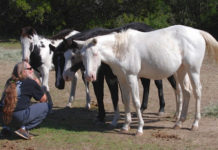Complex and murky, an illicit flow of weapons fuels fighting around the world. But one team works on the ground in conflict zones to painstakingly map out the supply chain. Its efforts are helping to prevent arms from reaching unscrupulous regimes, criminals and terrorist groups
The scenes are often eerily quiet. Armed battles may have been fought there just hours earlier, but when the investigators arrive with notebooks and cameras in hand, sometimes only feral dogs sniff around the discarded bedding, clothing – and weapons – that remain.
The team works just behind the frontline of conflict in places like Iraq, Libya, Somalia, South Sudan and Syria, moving in when fighting has moved on. Their job? To notice the small things. To document with meticulous care the dust-strewn remnants of combat and, they hope, to play a role in stemming the future flow of illegal weapons.
The investigators work for Conflict Armament Research (CAR), which runs the world’s most comprehensive map tracking the flow of arms into conflict zones. The organisation was established in 2011 by a group of weapons specialists, to work out how weapons are illegally sold or diverted into the hands of groups such as Islamic State, Al-Shabaab and Boko Haram.
In times of division and fear, good journalism is needed most.
So far active in 27 conflict-affected areas, CAR staff work alongside national security forces, such as the Iraq Counter Terrorism Services, to record the details of hundreds of thousands of weapons and ammunition, from rifles and bullets to improvised explosive devices. Every one is logged on iTrace, an EU-funded, publicly accessible database, and the evidence is supplied to governments, NGOs and UN bodies, in the hope that they will develop effective weapon management policies.
CAR itself receives funding from the EU, something that is “useful both financially and politically,” notes managing director Marcus Wilson, but it is an independent, non-governmental organisation. CAR has a small London office – around the corner from a pub on a nondescript central street – as well as outposts in Washington DC and Brussels. But it’s the 17 field investigators – the “boots on the ground” – who are central to CAR’s data-driven approach. Here, evidence is king, explains Wilson.

“It’s impossible to get the same accuracy from photographs sourced from social media or YouTube videos. There are so many derivatives of these weapons and you only really get that information by forensically examining them.”
The international community has talked about the problem of arms trafficking for decades, Wilson says, but lacked a clear approach. “Until this point, it’s been a lot of meetings, consultations and panels based on the truism that armed groups are getting weapons illegally, but without a good idea of how. We have been able to come in using evidence from the field to say ‘these weapons from these manufacturers, these exporters, are turning up in the hands of Islamic State, or Al-Shabaab or Boko Haram.’”
Once CAR uploads its findings, it’s up to policymakers to take action. The hope is, explains Wilson, that they will “turn the tap off, tighten that border area, work with their customs authorities, readdress their export controls – whatever necessary – to try to stop that from happening again”.
CAR’s research has already made waves. Companies that supplied products to Turkey, Jordan and other countries bordering Isis territory – products later found in an Isis weapon manufacturing plant – have stopped trading to these suppliers. “The Turkish government banned the trade of chemicals across its southern border; Canada adjusted its arms deals with Iraq after some of their items were found on the illicit market there,” adds Wilson.

In response to CAR’s report on Isis weapon supplies, the EU Parliamentary Assembly issued a motion to carry out further research on the supply of weapons to the group.
And in response to CAR’s findings on the export of dual-use vehicles (adapted for civilian and military use) without export licences, which ended up with armed groups in Central African Republic and Sudan, the government in the Netherlands improved its export controls on the vehicles.
CAR made headlines around the world last year, when its 200-page report revealed that nearly a third of all weapons used by Isis on the battlefield were originally made in the EU. And while most Isis weapons were ‘looted’ from the Iraqi and Syrian armies, some were originally provided by other countries – the US and Saudi Arabia among them – to Syrian opposition groups fighting against President Bashar al-Assad.
A murky world
Demand for CAR’s services is growing. Neither governments, nor weapons manufacturers and exporters want to be linked to such groups, explains Wilson: “As our reports have shown, components, weapons and ammunition made in a range of countries are turning up in the hands of the most evil and…









